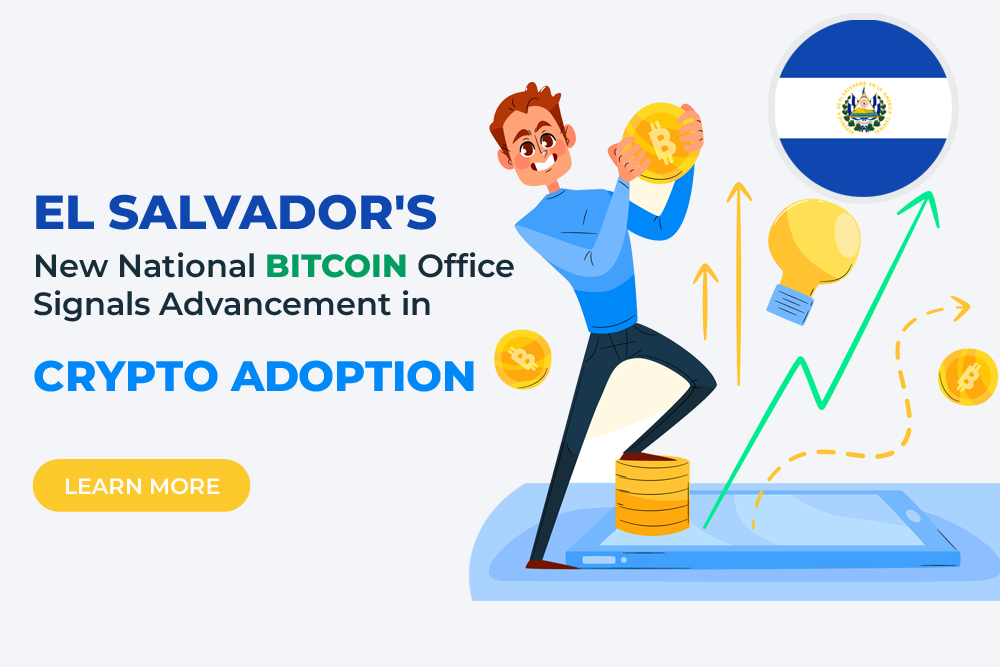
Próspera’s Bitcoin Revolution: A New Financial Era in Honduras
Revolutionizing Finance: Próspera’s Bold Bitcoin Move
In a groundbreaking financial development, Próspera, a special economic zone on Roatan Island in Honduras, has embraced a revolutionary approach by officially adopting Bitcoin (BTC) as its unit of account. This landmark decision, directed by Jorge Colindres, the acting manager and tax commissioner of Próspera, signifies a momentous advancement in the region’s financial landscape.
At the heart of Próspera’s adoption of Bitcoin lies a commitment to financial independence. This initiative allows individuals and businesses within the zone to transact and manage their financial affairs using their preferred currency. This move, however, is not without its challenges. The implementation of the “Final BTC Tax Payment Procedure” is currently facing obstacles due to technological constraints and external regulatory issues.
Global Context: Comparing with El Salvador
Próspera’s strategy echoes El Salvador’s earlier decision to make Bitcoin a legal tender in September 2021. El Salvador’s bold step, despite its difficulties, underscores an emerging trend where regions view cryptocurrencies as a means to foster economic empowerment and innovation.
The Advantages of Cryptocurrency Integration
The Próspera Special Economic Zone in Honduras has made a significant move by officially adopting Bitcoin (BTC) as its unit of account for valuing goods and services. This initiative, led by Jorge Colindres, the manager and tax commissioner of Próspera Zone for Employment and Economic Development (ZEDE), represents a commitment to financial and monetary freedom in the region. It allows businesses and individuals the flexibility to transact and manage finances in their preferred currency.
While this new development enables the use of Bitcoin for internal accounting, there are currently challenges in fully implementing the “Final BTC Tax Payment Procedure” due to technological and external regulatory limitations. Consequently, tax liabilities must still be reported in either US dollars or Honduran lempira until these issues are resolved. Entities wishing to adopt Bitcoin for accounting must notify the Próspera tax commission and reference an approved cryptocurrency exchange, like Coinbase or Kraken, within 30 days of the relevant tax period.
Próspera ZEDE has shown a progressive stance towards cryptocurrencies since its establishment in May 2020, aligning with El Salvador’s earlier decision to declare Bitcoin as legal tender. However, the Central Bank of Honduras does not guarantee cryptocurrency transactions, placing the responsibility and risk on the individuals involved.
The adoption of Bitcoin within Próspera is a notable step in the global cryptocurrency landscape, signaling the zone’s role as a pioneer in this field. This move is observed with great interest worldwide, as it may have significant long-term implications for economic systems and financial freedoms
Future Prospects and Global Implications
As Próspera and El Salvador trailblaze in cryptocurrency adoption, the world watches keenly to understand the long-term effects on their economies and financial systems. Their experiences could be a precursor for other regions contemplating similar approaches, possibly signaling a new chapter in global finance.
The journey of Próspera in adopting Bitcoin, along with its broader implications, reflects an evolving trend towards exploring alternative economic systems and embracing financial freedoms. This bold experiment in the global financial arena may offer valuable insights and lessons for other areas considering comparable pathways.
Open your free digital wallet here to store your cryptocurrencies in a safe place.

Layer 2 Solutions in 2024: Paving the Way for a Scalable and Efficient Blockchain Future
In 2024, Layer 2 solutions in the cryptocurrency space have become an essential tool for addressing the limitations inherent in traditional blockchain networks, particularly scalability issues. These solutions, built atop existing blockchains (Layer 1), offer a way to handle transactions more efficiently without compromising the underlying network’s security and integrity.
Understanding Layer 2 Solutions
The concept of Layer 2 solutions arises from the need to improve blockchain efficiency. The primary blockchain, also known as Layer 1, can only process a limited number of transactions within a given time frame. This limitation leads to congestion, slower transaction times, and higher fees, especially on networks like Ethereum, which hosts a multitude of decentralized applications and smart contracts.
Layer 2 solutions are akin to creating express lanes alongside a busy highway. While the main road (Layer 1) remains intact, these new lanes (Layer 2) allow for faster and more efficient travel of data. By handling transactions off the main chain but still anchored to it for security, Layer 2 solutions enhance transaction speed and reduce costs, offering a more scalable approach for blockchain networks.
Lightning Network and Bitcoin
The Lightning Network stands out as a prime example of a Layer 2 solution, primarily associated with Bitcoin. It enables quick, low-cost transactions by creating off-chain payment channels between parties. This system is revolutionary for Bitcoin, pivoting its use from a store of value (“digital gold”) to a practical medium for everyday transactions.
Ethereum’s Rollups
Ethereum, known for its smart contracts, has actively embraced Layer 2 solutions, particularly through the implementation of rollups. These rollups work by bundling multiple transactions into a single one that is processed on the main chain. This innovation significantly speeds up the transaction process while reducing Ethereum’s notorious gas fees, making transactions more user-friendly.
Arbitrum and Optimistic Rollups
Arbitrum, a Layer 2 solution using optimistic rollups, has garnered significant attention within the crypto community. It offers scalable, efficient transaction processing and has become a hub for decentralized finance (DeFi) projects due to its user-friendly infrastructure. With a robust Total Value Locked (TVL) and a growing user base, Arbitrum represents a major advancement in Layer 2 technology.
BASE by Coinbase
BASE, developed by Coinbase, is another Layer 2 solution that has witnessed remarkable growth. Leveraging Coinbase’s reputation and reach, BASE has attracted a significant number of users, reflected in its high transaction volumes and position in the TVL rankings. While BASE continues to evolve, it represents a significant step in the wider adoption of Layer 2 solutions.
Challenges and Future Prospects
Despite the numerous advantages, Layer 2 solutions also face challenges, primarily relating to interoperability and maintaining the decentralized ethos of blockchain technology. Ensuring seamless integration with various Layer 1 networks and other Layer 2 solutions, while preserving security and decentralization, remains a key area of development.
Looking ahead, Layer 2 solutions are poised to play a critical role in the broader adoption and utility of blockchain technology. By addressing scalability and efficiency issues, they open up new possibilities for complex and interactive decentralized applications, fostering innovation in fields like DeFi and NFTs.
The Impact on the Crypto Ecosystem
The introduction and evolution of Layer 2 solutions have profound implications for the cryptocurrency ecosystem. They enhance the user experience by reducing transaction fees and waiting times, crucial for mainstream adoption. Moreover, Layer 2 solutions pave the way for more sophisticated and practical applications of blockchain technology, extending its reach beyond traditional financial transactions to areas like gaming, supply chain management, and more.
In summary, the development and integration of Layer 2 solutions in 2024 mark a significant milestone in the evolution of blockchain technology. They offer a practical and scalable way to overcome the limitations of Layer 1 networks, paving the way for a more efficient, user-friendly, and diverse blockchain ecosystem.
Open your free digital wallet here to store your cryptocurrencies in a safe place.

Revolutionizing Energy Access: The Role of Bitcoin Mining in Sub-Saharan Africa
The quest for universal energy access is one of the most pressing issues of our time, critical to improving the quality of life globally. In this endeavor, Bitcoin mining emerges not just as a technological marvel but as a novel financial tool that can catalyze the development of energy infrastructure, particularly in energy-deprived regions like Sub-Saharan Africa (SSA).
Bitcoin Mining as a Catalyst for Energy Access
In SSA, the lack of electricity is a stark reality for over 600 million people. This energy deficit stifles economic growth, hampers healthcare and education, and perpetuates poverty. Bitcoin mining, with its considerable energy requirements, presents a unique opportunity in this context. By creating a demand for electricity, it can drive the development of energy infrastructure, particularly renewable sources.
The synergy between renewable energy and Bitcoin mining is already taking shape in various parts of SSA. Companies like Gridless in Kenya are leading this charge by utilizing hydropower for Bitcoin mining. These ventures ensure a consistent demand for electricity, making renewable energy projects more viable and financially attractive. Furthermore, they bring electricity to rural areas, often for the first time, dramatically transforming local communities’ lives.
Solar Power: A Sustainable Alternative for Mining
In regions where traditional mining is challenged by climatic conditions, solar power stands out as a sustainable alternative. The establishment of large-scale solar farms in countries like Morocco and the Seychelles reflects an increasing interest in using solar energy for Bitcoin mining. This approach not only mitigates the environmental impact of mining but also contributes to the energy grid, providing a two-fold benefit to the economy and the environment.
The path to integrating Bitcoin mining with energy development is not without its challenges. In many African countries, regulatory uncertainty and logistical hurdles, such as the difficulty in obtaining energy development licenses or importing mining hardware, persist. These challenges call for more supportive regulatory frameworks and investment in infrastructure to harness the full potential of Bitcoin mining in advancing energy access.
Financial Empowerment through Decentralization
Beyond the direct impact on energy access, Bitcoin mining offers financial empowerment through its decentralized nature. This feature of cryptocurrency is particularly significant in regions where financial systems are underdeveloped or inaccessible to large segments of the population. By providing a means of financial participation and privacy, Bitcoin mining can contribute to broader economic growth and empowerment.
The Broader Impact and Future Prospects
The potential of Bitcoin mining extends beyond just providing electricity; it represents a paradigm shift in how we approach energy and economic challenges in the developing world. Incentivizing the exploration of renewable energy sources for mining can lead to a revolution in the energy sector. This movement could propel many regions in SSA and beyond towards greater energy independence and economic stability.
Bitcoin mining, often under scrutiny for its environmental impact, holds untapped potential for global energy infrastructure development. By leveraging renewable energy sources and overcoming regulatory and logistical challenges, Bitcoin mining can significantly contribute to building out energy infrastructure, particularly in underserved regions. The future of Bitcoin mining thus holds the promise of not just electrifying regions but also of reshaping their economic landscapes, paving the way for a brighter, more connected world.
Open your free digital wallet here to store your cryptocurrencies in a safe place.

Unlocking Argentina’s Future: Milei, Bitcoin, and Economic Revival
The Emergence of Milei: A Libertarian Voice in Argentina
In the annals of Argentine politics, Javier Milei has emerged as a distinct voice, captivating attention not just for his unorthodox demeanor but also for his alignment with libertarian ideals. His advocacy for Austrian economics, coupled with a penchant for outspoken rhetoric, swiftly garnered a following, largely amplified by his appearances on national television. However, it was not just his shaggy hair or vibrant personality that resonated; it was his alignment with libertarian values that struck a chord amid a population grappling with economic turmoil.
Television, Bitcoin, and Milei’s Meteoric Rise
Milei’s entry into the public sphere was catalyzed by his appearances on Argentine late-night television, where his impassioned advocacy of libertarian ideas found resonance. Coincidentally, this period also witnessed the burgeoning interest in Bitcoin within Argentina and Latin America. For many in the region, their journey into the realms of Bitcoin and alternative financial systems aligned with Milei’s vocal criticism of the traditional monetary system.
His alignment with Bitcoin’s ethos became evident, with occasional nods to the cryptocurrency’s potential, although his grasp of its intricacies remained in evolution. Despite this, his staunch views on money, central banking, taxation, and government’s role struck a chord with the Bitcoin community, paving the way for mutual interest.
The Argentine Quandary: Milei’s Mandate and Economic Imperatives
Argentina finds itself ensnared in a vortex of economic challenges, epitomised by skyrocketing inflation, fiscal deficits, and mounting debt burdens. Milei’s rallying cry, “No hay plata” (There’s no money), encapsulates the dire fiscal situation that propelled him to victory. His mandate is not just about solving immediate problems but resurrecting Argentina’s erstwhile global stature.
His proposed policy reforms, including curbing central bank influence and slashing public spending, aim to avert the specter of hyperinflation. Additionally, managing the nation’s staggering debt, especially with the IMF, poses a complex conundrum, compounded by the IMF’s cautionary stance on cryptocurrency use.
Dollarization vs. Hyperbitcoinization: A Dichotomy in Economic Strategy
Milei’s proposal for dollarisation stands at odds with the fervor for hyperbitcoinization, marking a significant contradiction in his economic strategy. However, this move is deemed imperative to stabilize Argentina’s economic turbulence. Simultaneously, his proposition of allowing currency choice resonates with the populace’s inclination toward USDt, locally known as “criptodólares.”
The convergence of Milei’s policies and Bitcoin’s potential engenders a nuanced narrative. While some anticipate gradual Bitcoin adoption aligned with fiscal stabilization, others envisage a comprehensive strategy exploring Bitcoin’s role in altering tax policies, mining initiatives, or even integrating Bitcoin-backed securities.
The Milei Administration’s Economic Overhaul and Bitcoin’s Role
Amidst pledges to reduce onerous taxes, the success of Milei’s administration hinges on taming inflation, executing dollarization, and reshaping the financial landscape. As the administration grapples with the nation’s economic turmoil, Bitcoin proponents eagerly await clarity on its potential integration within Argentina’s economic fabric.
The hope persists that Milei’s appreciation for freedom and Bitcoin’s disruptive nature will converge into policies that align with Argentina’s long-term prosperity. Conversations between Milei’s team and Bitcoin advocates are anticipated in 2024, seeking insights into the administration’s post-policy implementation vision.
Navigating Argentina’s Future Amidst Economic Resurgence
Argentina stands at a crossroads, with Milei’s ascent signifying a departure from traditional political ideologies. The convergence of his libertarian principles with Bitcoin’s disruptive potential presents an intriguing narrative, one that could redefine Argentina’s economic trajectory.
Amidst the uncertainty, there’s a collective assurance that Milei, a proponent of individual freedom and Bitcoin’s potential, possesses the requisite acumen to navigate Argentina’s economic revival. Whether his policies will pave the way for Bitcoin’s integration remains an evolving saga, yet the promise of change hangs palpably in the air, intertwined with the fate of Argentina’s economic resurgence.
Open your free digital wallet here to store your cryptocurrencies in a safe place.

Pioneering Bitcoin Mining for a Carbon-Negative Future
In a groundbreaking report, self-proclaimed philanthropist Daniel Batten has unveiled a compelling vision for Bitcoin to emerge as a zero-emission network. Through the strategic utilization of carbon-negative energy sources, Batten contends that Bitcoin mining can not only offset its carbon footprint but also make a positive contribution to environmental preservation.
The Methane Capture Revolution
At the heart of Batten’s proposal lies a visionary concept: the combustion of stranded methane gas to power Bitcoin mining. This innovative approach has already gained traction worldwide, representing a crucial strategy in mitigating climate change. According to Batten’s comprehensive study, this process has the potential to slash the network’s emissions by a remarkable 63%.Currently, a mere 1.57% of the Bitcoin network relies on carbon-negative sources. Despite this modest figure, it exerts a significant -4.2% impact on the overall carbon intensity of the Bitcoin network. This seemingly small fraction holds the key to transforming the network into a carbon-negative powerhouse.
Exemplary Implementations
Batten’s research draws on a wealth of data from various flare gas Bitcoin miners, including industry leaders like Crusoe Energy in Colorado, Jai Energy in Wyoming, and Arthur Mining in Brazil. Additionally, the study highlights the commendable efforts of miners who are harnessing waste gases from animal farms, as seen in operations in Slovakia.
Enterprising Northern Irish farmer Owen has emerged as a trailblazer in the quest for sustainable Bitcoin mining. Teaming up with Scilling Digital Mining, Owen has harnessed biogas emitted from farm waste, redirecting it from the atmosphere towards the lucrative process of Bitcoin mining. This innovative approach not only aligns with principles of environmental stewardship but also holds the promise of newfound revenue streams for farmersMark Morton, the astute Managing Director at Scilling, envisions Ireland’s farming communities as the vanguard of this transformative technology. By capturing waste gas from agricultural activities, Ireland has the potential to make substantial reductions in its agricultural emissions. Moreover, this initiative could unlock a new source of income for farmers, providing a boost to the agricultural sector and setting the stage for a greener future.
Batten’s Call to Arms
Batten, once a philanthropist and venture capitalist, has now channeled his energies towards environmental advocacy, making Bitcoin mining his “most important mission.” In a recent presentation, he underscored the critical role of methane capture in the fight against climate change, positioning Bitcoin mining as a powerful agent of change.Batten’s research and advocacy serve as a stark reminder of the urgency in addressing climate change. As the world grapples with the repercussions of global warming and environmental degradation, innovative solutions like methane capture in Bitcoin mining offer a beacon of hope for a sustainable future.
Conclusion: A New Frontier in Bitcoin Mining
Daniel Batten’s report paints a compelling picture of Bitcoin mining as a carbon-negative endeavor with the potential to revolutionize the industry. Through the strategic harnessing of stranded methane gas, Bitcoin miners can emerge as unsung heroes in the fight against climate change. As pioneers like Owen and forward-thinking companies like Scilling lead the charge, we stand on the precipice of a paradigm shift – where Bitcoin mining evolves from an energy-intensive process into a powerful force for environmental preservation. It is a testament to the indomitable spirit of human ingenuity in the face of one of the greatest challenges of our time.
Open your free digital wallet here to store your cryptocurrencies in a safe place.

Unlocking the Future: The Promise and Potential of Bitcoin ETFs in Mainstream Investment
Bitcoin ETFs: Catalyzing Institutional Participation
Following a period of subdued engagement triggered by the collapse of major crypto players like FTX during the extended crypto winter of 2022, the momentum within the crypto sector has witnessed a rejuvenation. Bitcoin, alongside various other cryptocurrencies, languished through a phase of lackluster trading as regulatory scrutiny enveloped multiple crypto exchanges. However, a transformative shift was catalyzed by the news that industry powerhouses such as BlackRock, Fidelity, and Valkyrie were vying for approval to introduce spot Bitcoin ETFs, effectively reigniting investment enthusiasm in the crypto realm
While institutional contenders had previously submitted spot Bitcoin ETF proposals to the United States Securities and Exchange Commission (SEC), these initiatives had met with varying outcomes, ranging from withdrawal to outright rejection. A milestone was marked with the SEC’s approval of the inaugural Bitcoin futures ETF, the ProShares Bitcoin Strategy ETF, in October 2021—a significant stride toward mainstream acceptance.
Institutional Entrants and the Balancing Act
The pivotal move by asset management titan BlackRock to file a spot Bitcoin ETF application with the SEC has reshaped the landscape, elevating the probability of the regulatory green light. Industry expert Eric Balchunas from Bloomberg posits a 50% likelihood of BlackRock’s spot Bitcoin ETF securing approval—an event that could be transformative for the industry. The subsequent wave of ETF filings initiated by BlackRock on June 16 spurred a cascade of similar applications from WisdomTree, Invesco, Valkyrie, and others. A total of seven institutional heavyweights have now embarked on the journey to establish spot Bitcoin ETFs.
Industry pundits predict the period spanning 2023 to 2024 to be pivotal in securing spot Bitcoin ETF approval. Chief Strategy Officer of Bitrue, Robert Quartly-Janeiro, underscores the economic backdrop marked by surging inflation, intricate money supply dynamics, and elevated interest rates—a fertile environment for cryptocurrencies to flourish. Despite market volatility, institutional faith in cryptocurrencies remains resolute. The influx of institutional investors into the crypto landscape has expanded significantly compared to a mere year ago. Even trailblazers like MicroStrategy, who temporarily suspended their Bitcoin acquisitions, have reignited their involvement, actively accumulating Bitcoin in 2023.
Balancing Risk and Reward
The Chief Technology Officer at Bitfinex, Paolo Ardoino, underscores Bitcoin’s enduring value as a safeguard against devaluation—a sentiment echoed by traditional financial institutions. The upsurge in applications for Bitcoin spot market ETFs reflects a burgeoning demand from both investors and issuers, signifying a broader institutional momentum towards embracing Bitcoin.
The reticence exhibited by institutions over the past year was partially catalyzed by events like the FTX incident and subsequent banking challenges. The evolving regulatory terrain is paving the way for institutions to reevaluate their stance and cautiously re-enter the crypto space.MicroStrategy’s unwavering commitment to Bitcoin stands as a testament to institutional leadership. CEO Michael Saylor’s resolve to continue accumulating Bitcoin, even amid price turbulence, underscores the significance of institutional conviction.
Institutional Push and Market Resurgence
The resurgence of institutional interest rekindles optimism for a potential new bull run. In the prior bullish trajectory of 2020 to 2021, institutional investments were instrumental, with companies like MicroStrategy and Tesla integrating Bitcoin into their balance sheets. The collective impact of institutional and retail interest is poised to amplify the growth of cryptocurrency market capitalization.
The potential approval of BlackRock’s ETF application introduces the prospect of doubling Bitcoin’s value. This anticipated move not only intensifies institutional interest but also augments competition among financial entities, channeling increased funds from traditional markets into the crypto domain. Alongside institutional momentum, regulatory advancements in markets like Hong Kong open avenues for broader retail participation, offering a diverse spectrum of drivers for the impending bull run.
Bitcoin Halving and Institutional Propulsion
With Bitcoin’s halving event scheduled for April 2024, institutional engagement assumes a pivotal role in shaping the future crypto landscape. Historical patterns underscore that bull runs often coincide with halving events—a phenomenon attributed to the scarcity-driven price surge as investors, both institutional and retail, seek to bolster their Bitcoin portfolios.
Open your free digital wallet here to store your cryptocurrencies in a safe place.

Understanding the Environmental Impact of Bitcoin Mining: KPMG’s Insights
Understanding Responsible Investing and ESG Criteria
KPMG, the renowned Big-4 consulting giant, has recently released a comprehensive 12-page report delving into the environmental impact of Bitcoin mining. The report sheds light on the crucial role of Environmental, Social, and Corporate Governance (ESG) criteria in responsible investing, with a particular focus on the environmental sustainability of production activities.
The report starts by acknowledging that Bitcoin is now recognized as a mature asset class, but it remains widely misunderstood despite its growing adoption. The objective of the report is to assess the actual environmental, social, and governance impact of Bitcoin mining, aiming to debunk existing misconceptions and provide a nuanced perspective.
Comparing Bitcoin Mining Emissions to Other Industries
While the report highlights some high-impact use cases of Bitcoin that have demonstrated value for users and society, KPMG’s primary focus is on the environmental aspects of mining. In this regard, KPMG emphasizes that Bitcoin mining’s emissions are relatively low when compared to various other human activities. Notably, Bitcoin mining emits only 67 MtCO2e per year, which is significantly less than gold mining’s emissions at 100 MtCO2e. Even more staggering is the comparison to emissions from tourism (4,500 MtCO2e) and the fashion industry (2,100 MtCO2e). KPMG aptly points out that deforestation alone contributes over 1,000 MtCO2e, making it evident that the focus should be on larger emissions sources rather than singling out Bitcoin mining’s relatively modest impact.
To further mitigate the environmental impact of Bitcoin mining, KPMG suggests several strategies that can be adopted by the industry. One of the most effective measures is to embrace renewable energy sources, such as wind and solar power. Texas, for instance, has successfully attracted many miners by offering an abundance of renewable energy options, which now accounts for 59% of the US’s total mining activities.
Additionally, Bitcoin mining can play a crucial role in balancing power grids, particularly by reducing energy consumption during peak times. This approach benefits renewable energy producers and contributes to a more sustainable energy ecosystem.
Responsible Practices and Energy Efficiency
Miners can also implement energy-saving practices during times of energy scarcity, a measure that some miners have already been adopting. By being more efficient in energy usage, miners can reduce their environmental footprint and contribute to more responsible mining practices.
Another innovative idea suggested by KPMG involves recycling the waste heat produced during the mining process. This waste heat, if harnessed properly, can serve as a valuable resource, replacing the need for additional energy consumption to generate the same amount of heat through other means. For miners in colder regions, this approach could even lead to cost savings by reducing their heating expenses.
A Call for Sustainable Growth in Bitcoin Mining
KPMG emphasizes the competitive nature of the Bitcoin mining industry, where miners are driven to streamline their operations and manage production costs effectively. Electricity constitutes the largest ongoing input cost for mining operations, prompting miners to seek the lowest-cost sources of electricity, often tied to underutilized hydro, wind, or solar power.
In conclusion, KPMG’s latest report on the environmental impact of Bitcoin mining provides valuable insights into the misconceptions surrounding this technology. While acknowledging the significance of ESG criteria in responsible investing, the report highlights that Bitcoin mining’s emissions are relatively minimal when compared to other industries. To further reduce the environmental impact, KPMG suggests embracing renewable energy sources, balancing power grids, implementing energy-saving measures, and recycling waste heat. These strategies not only contribute to a more sustainable mining ecosystem but also align with the growing focus on environmentally friendly investing. As the Bitcoin mining industry continues to evolve, a continued commitment to responsible practices will be essential in creating a more sustainable and environmentally conscious future.
Open your free digital wallet here to store your cryptocurrencies in a safe place.

Saifedean Ammous Joins El Salvador’s National Bitcoin Office as Economic Advisor
El Salvador’s commitment to embracing Bitcoin as legal tender continues to make waves in the crypto industry. In a significant development, Saifedean Ammous, the renowned economist and author of “The Bitcoin Standard,” has joined the National Bitcoin Office of El Salvador as an economic advisor. This strategic move highlights the country’s determination to leverage the potential of cryptocurrencies and promote financial innovation. Ammous has shared his insights on El Salvador’s Bitcoin strategy, expressing optimism about the country’s potential for economic growth and debt reduction. This article delves into Ammous’s role, his views on El Salvador’s initiatives, and the broader implications for cryptocurrency adoption.
Ammous’s Vision for El Salvador
In an interview with the local newspaper ‘Diario El Salvador,’ Ammous expressed confidence in El Salvador’s ability to become debt-free within the next five to ten years. He emphasized the country’s immense potential to become a hub of innovation, owing to its progressive policies, including the adoption of a zero tax rate for technology companies. Ammous commended President Nayib Bukele’s initiatives, highlighting their attractiveness compared to nations adopting contrasting cryptocurrency taxation policies. Although not explicitly mentioned, Ammous alluded to recent debates on cryptocurrency taxation in countries such as the United States, the United Kingdom, Portugal, and Italy. El Salvador’s commitment to creating a favorable environment for businesses and entrepreneurs positions it as a leader in the global crypto landscape.
The Role of the National Bitcoin Office
The National Bitcoin Office, established through Decree No. 49, has been pivotal in driving El Salvador’s cryptocurrency strategy. Its formation last year involved collaboration between President Bukele and prominent Bitcoin supporters Stacy Herbert and Max Keiser. The office plays a central role in overseeing cryptocurrency-related matters in the country, ensuring regulatory clarity, and facilitating the integration of Bitcoin into the economy. Ammous’s appointment as an economic advisor adds another layer of expertise to the office, enhancing the President’s decision-making process. Notably, Ammous has volunteered his services without requesting financial compensation, underscoring his commitment to advancing the adoption of cryptocurrencies in El Salvador.
El Salvador’s Pioneering Initiatives
El Salvador has been a trailblazer in its national cryptocurrency strategy. It became the first country to adopt Bitcoin as legal tender in September 2021, signaling a major milestone in the mainstream acceptance of cryptocurrencies. Furthermore, the introduction of innovative Bitcoin bonds last year demonstrated El Salvador’s commitment to harnessing the potential of digital assets to stimulate economic growth. While initial reports on Bitcoin adoption in the country varied, recent trends indicate an upsurge in uptake, fueled in part by increased tourism. El Salvador’s proactive approach to cryptocurrency integration has attracted global attention and positioned the nation as a vanguard of financial innovation.
US Regulatory Developments
The United States, a global powerhouse in finance and technology, has recently witnessed significant regulatory discussions surrounding cryptocurrencies. President Joe Biden’s administration proposed imposing excise taxes on Digital Asset Mining Energy (DAME), which could have subjected cryptocurrency mining companies to a 30% tax. However, as part of the agreement reached on the US debt ceiling, this tax proposal is currently being blocked. The Biden administration argued that such taxes were necessary to address the environmental and social impacts of mining operations. The ongoing debates on cryptocurrency taxation highlight the contrasting approaches countries are taking toward digital assets, further emphasizing the significance of El Salvador’s progressive stance.
Conclusion
Saifedean Ammous’s appointment as an economic advisor to El Salvador’s National Bitcoin Office marks a significant milestone in the country’s journey towards cryptocurrency adoption. His expertise and insights will undoubtedly contribute to shaping the nation’s economic strategies and further solidify its position as a leader in the crypto industry. With Ammous’s guidance, El Salvador is poised to achieve its ambitious goals, including debt reduction and the establishment of an innovative hub for cryptocurrency innovation.
As El Salvador continues to implement its progressive cryptocurrency policies, other nations around the world are closely observing the outcomes. The country’s pioneering initiatives, such as adopting Bitcoin as legal tender and creating a supportive regulatory framework, have attracted attention and sparked conversations about the future of finance. El Salvador’s bold approach serves as an inspiration for countries grappling with the challenges and opportunities presented by digital currencies.
Furthermore, the collaboration between the National Bitcoin Office and Saifedean Ammous underscores the importance of bringing together diverse expertise to drive meaningful change. As cryptocurrencies gain traction and reshape the global financial landscape, the input of renowned economists like Ammous becomes invaluable in navigating the complexities of this evolving ecosystem. To conclude, Saifedean Ammous’s role as an economic advisor to El Salvador’s National Bitcoin Office adds a new dimension to the country’s cryptocurrency journey. With his expertise and insights, coupled with El Salvador’s progressive initiatives, the nation is poised to make significant strides in leveraging the potential of cryptocurrencies for economic growth and financial empowerment. As the global community watches El Salvador’s progress, it is clear that the country’s commitment to innovation and inclusion has the potential to reshape the future of finance.
Open your free digital wallet here to store your cryptocurrencies in a safe place.

NFTs: Nike Takes the Digital Swoosh to the Next Level in Collaboration with EA Sports Games
In a groundbreaking move that blurs the lines between physical and digital realms, Nike has embarked on a captivating journey into the world of non-fungible tokens (NFTs). Teaming up with EA Sports Games, the iconic sportswear brand is revolutionising the way fans engage with their favorite sports moments. By embracing this cutting-edge technology, Nike aims to transform the very essence of fandom and collectibles. This article delves into the exciting collaboration and its potential implications for the future.
A Marriage of Tradition and Innovation
Nike’s partnership with EA Sports Games represents a harmonious marriage between the traditional sports industry and the innovative blockchain technology that underpins NFTs. While the former provides a rich tapestry of athletic achievements and moments, the latter unlocks the power to digitise and authenticate these experiences in unprecedented ways.
The Power of Digital Collectibles
NFTs have skyrocketed in popularity, offering collectors a unique opportunity to own and trade digital assets that hold tangible value. By extending their iconic Swoosh logo into the digital realm, Nike is capitalising on this trend, giving fans a chance to own exclusive virtual merchandise and unforgettable moments from their favorite EA Sports Games. From iconic sneakers to legendary in-game moments, these digital collectibles take fandom to new heights.
At the heart of this collaboration lies the NFT Swoosh, a tokenised representation of Nike’s iconic logo. This virtual badge of honor serves as a digital certificate, granting its owner exclusive access to an array of personalised content and experiences. The NFT Swoosh captures the essence of Nike’s brand identity while immersing fans in a world where virtual and physical boundaries are seamlessly blurred.
In addition, by partnering with EA Sports Games, Nike leverages the power of gaming to enhance the allure of NFTs. EA Sports has long been synonymous with immersive sports experiences, capturing the hearts of millions of fans worldwide. With the integration of NFTs, EA Sports Games introduces a groundbreaking feature that allows players to unlock and collect unique virtual items, representing a fusion of real-life athleticism and digital innovation.
The Rise of NFTs in the Sports Industry
Nike’s foray into the world of NFTs signifies a broader trend within the sports industry. Recognising the immense potential of blockchain technology, sports organisations are embracing NFTs to engage fans and create new revenue streams. From soccer clubs tokenising match moments to basketball leagues launching NFT collectibles, the sports industry is riding the wave of digital innovation, revolutionising fan experiences in the process.
Beyond Ownership: A New Era of Fan Engagement
The allure of NFTs extends far beyond mere ownership of digital assets. Nike’s collaboration with EA Sports Games demonstrates the potential for fan engagement to reach unprecedented levels. With the integration of NFTs, fans can actively participate in the evolution of their beloved franchises, shaping the narrative of the digital sports landscape. This newfound involvement creates a symbiotic relationship between fans, brands, and athletes, driving a deeper sense of community and passion.
Furthermore, NFTs hold immense potential for athletes as well. By tokenising their most iconic moments and merchandise, athletes can connect with fans on an intimate level while monetising their achievements. These digital assets can be used to support charitable causes, reward loyal supporters, and foster a direct relationship with their fan base. NFTs empower athletes to take control of their own narratives, transforming the way they interact with their audience.
Conclusion
Nike’s bold collaboration with EA Sports Games showcases the transformative power of NFTs in the sports industry. By embracing this cutting-edge technology, Nike has paved the way for a new era of fan engagement and collectibles. The collaboration with EA Sports Games not only leverages the popularity of gaming but also bridges the gap between physical and digital experiences, creating a seamless and immersive environment for sports enthusiasts.
As NFTs continue to gain momentum, it is clear that this digital revolution is here to stay. The convergence of blockchain technology, sports, and gaming opens up a world of possibilities for fans, athletes, and brands alike. Nike’s entry into the NFT space signifies a paradigm shift in how we perceive and interact with sports memorabilia and moments.
Looking ahead, it will be fascinating to see how other sports brands and organisations follow in Nike’s footsteps, exploring the potential of NFTs to enhance fan experiences and drive innovation within the industry. As technology advances, we can expect even more immersive and interactive NFT offerings that blur the boundaries between physical and digital realms.
In conclusion, Nike’s collaboration with EA Sports Games to introduce NFTs, particularly the NFT Swoosh, marks an exciting milestone in the sports and blockchain landscape. This partnership not only capitalizes on the rising popularity of NFTs but also reflects a broader trend of sports organisations embracing digital innovation. As fans eagerly embrace this new form of collectibles, NFTs have the potential to reshape the sports industry, enabling deeper fan engagement, athlete empowerment, and a transformative fan experience that transcends traditional boundaries. The Nike NFT Swoosh represents a tangible step towards the future, where virtual and physical worlds intertwine to create a more immersive and dynamic sports ecosystem.
Open your free digital wallet here to store your cryptocurrencies in a safe place.

Monero Community Defends Privacy in the Face of Mordinals’ Scrutiny
The Monero community, renowned for its unwavering commitment to privacy and security, has recently found itself under scrutiny from a group of critics known as Mordinals. These critics have voiced concerns about the alleged misuse of Monero’s privacy features for illicit activities, sparking a heated debate within the cryptocurrency community. Despite the criticisms, the Monero community remains resolute in their stance, emphasizing privacy as an essential human right and defending the integrity of Monero as a decentralized, censorship-resistant digital currency. As the controversy deepens, the clash between privacy advocates and those demanding increased transparency raises important questions about the role of privacy in the digital age.
Privacy as a Cornerstone of Monero
Monero, often hailed as the leading privacy-centric cryptocurrency, has garnered a dedicated following due to its robust focus on user anonymity. Through the use of advanced cryptographic techniques such as ring signatures, confidential transactions, and stealth addresses, Monero ensures that transactional details, including sender, recipient, and transaction amount, remain shielded from prying eyes. Critics argue that this privacy-centric approach facilitates illicit activities, but the Monero community vehemently rejects these claims. They contend that privacy is not synonymous with criminal intent, but rather an inherent right that should be safeguarded to protect individuals’ financial information from indiscriminate surveillance or exploitation.
Monero’s Community Responds to Mordinals’ Concerns
The Monero community has risen to the challenge of addressing the accusations put forth by the Mordinals. Supporters of the cryptocurrency assert that privacy is a frequently misunderstood concept, often wrongly associated with illicit deeds. They stress that privacy is a multifaceted notion that extends beyond the realm of cryptocurrencies, manifesting in various aspects of daily life, including communication, finance, and personal affairs.
In response to the concerns raised by the Mordinals, Monero advocates maintain that the same privacy features that enable illicit use also empower law-abiding individuals. They highlight how Monero’s privacy protections can benefit marginalized communities, political dissidents, journalists, and others who rely on confidential financial transactions to protect their safety and well-being.
Moreover, the Monero community underlines that the transparency of blockchain technology allows for the detection of illicit activities when necessary. Law enforcement agencies have developed sophisticated tools to analyze blockchain data and identify patterns that indicate potential criminal behavior. Monero’s privacy features do not render it impervious to investigation; instead, they provide a crucial layer of protection for users’ financial privacy by default.
Preserving Financial Privacy as a Fundamental Right
As explained before, for the Monero community, financial privacy is a fundamental human right that should not be compromised. They argue that in an increasingly digitized world, individuals must have control over their financial data and be able to decide who has access to it. With the proliferation of data breaches, identity theft, and intrusive surveillance, the need for robust privacy protections has become more apparent than ever.
The Monero community firmly believe that privacy encourages free expression, fosters innovation, and ensures individuals’ autonomy over their personal finances. By preserving financial privacy, they contend, Monero and other privacy-centric cryptocurrencies enable financial inclusivity and empower individuals to reclaim control over their economic lives. While the debate surrounding privacy and cryptocurrencies rages on, the Monero community remains steadfast in its commitment to privacy as a fundamental right. They strive to preserve the integrity of Monero and promote a future where individuals can transact securely and privately.The clash between privacy advocates and those calling for increased transparency raises crucial questions about the balance between privacy and regulation in the digital age. While it is important to address concerns regarding potential illicit activities, it is equally important to recognise the broader implications of eroding privacy rights.
Conclusion
In conclusion, the Monero community remains unwavering in their defense of privacy amidst scrutiny from the Mordinals. They assert that privacy is not only compatible with legitimate financial transactions but is essential for individual autonomy and the protection of personal information. As discussions surrounding privacy and cryptocurrencies evolve, finding common ground between privacy advocates and regulatory concerns will be vital in shaping a future where both financial integrity and personal freedom are respected. The Monero community stands at the forefront of this conversation, advocating for privacy as a cornerstone of digital currencies and emphasizing the importance of preserving privacy rights in the digital age.
Open your free digital wallet here to store your cryptocurrencies in a safe place.